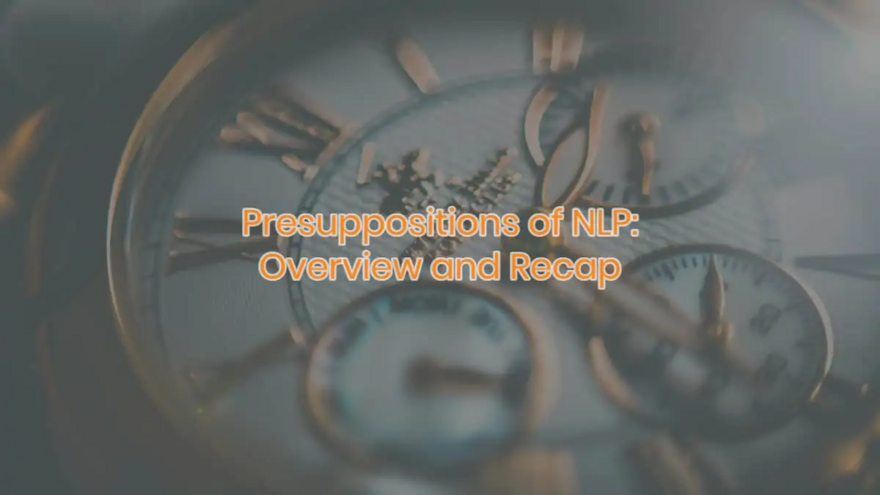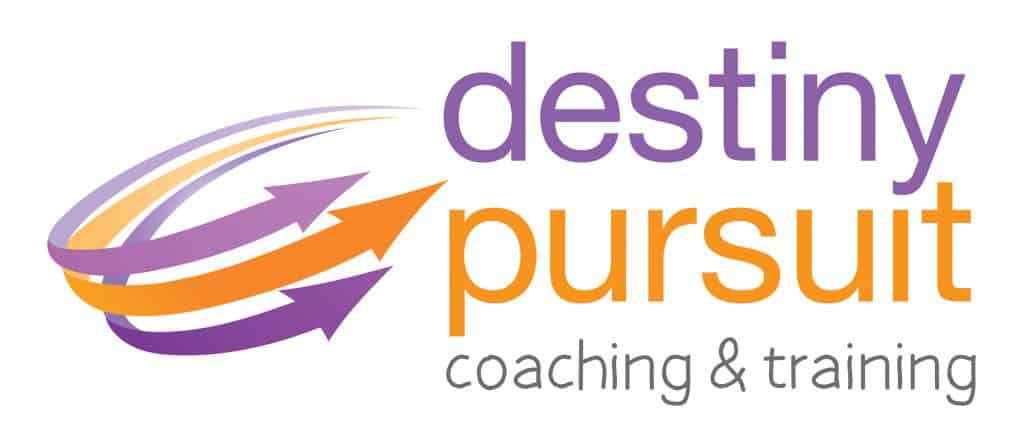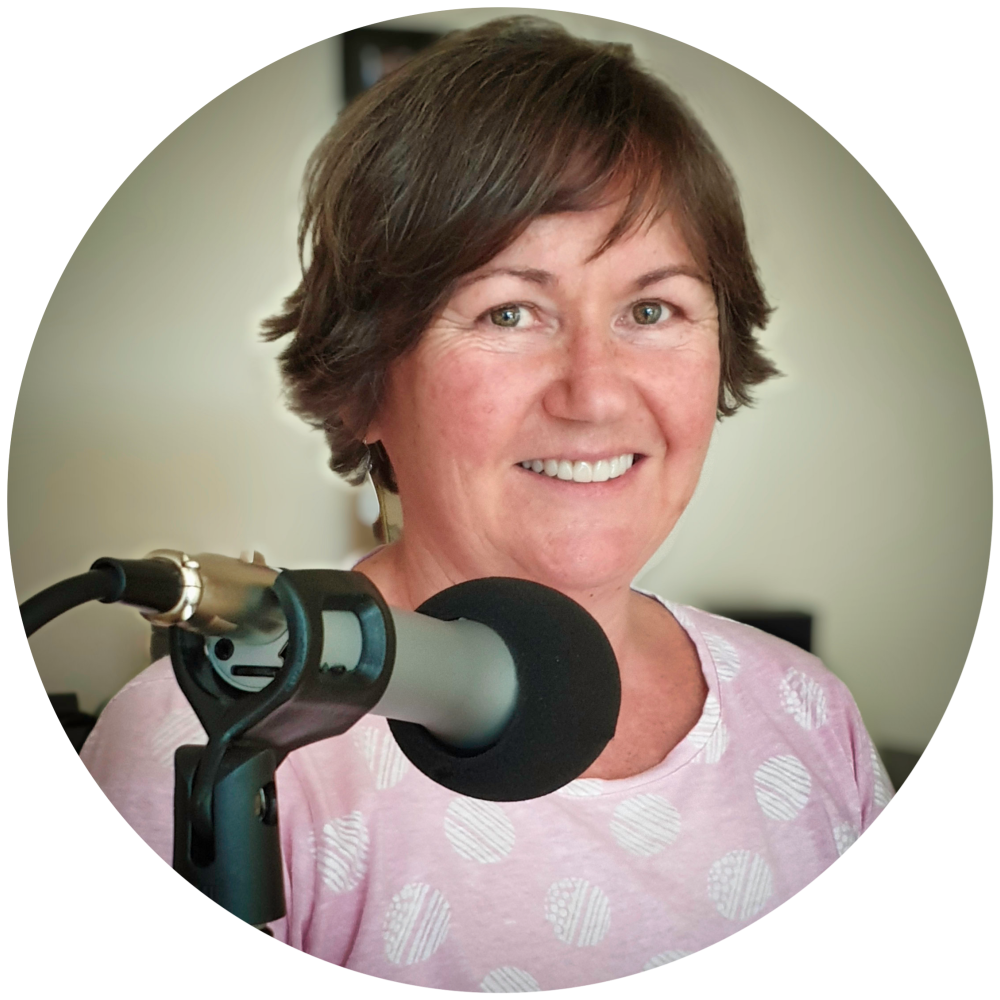Presuppositions of NLP: Overview and Recap - NLP Matters, Episode #036

The Presuppositions of NLP provide us with a kind of code of conduct or compass that guides us as we use and apply powerful NLP techniques. Together, they form the ecological framework that ensures that the practice of NLP is constructive and expansive.
In this episode, we’ll review these presuppositions and discover how when looked at as a whole, we have a really solid framework not only for how we use NLP but for our living our lives in general.
Listen to the podcast to learn more.
Listen to the Podcast
Here are some key takeaways from this episode:
The Presuppositions of NLP are a set of beliefs that are resourceful in that they serve us and serve others. Unlike other “deficit” modalities which start from the premise that we are broken, and we need to be fixed, NLP is a growth and resource-rich model that is built on the belief there is nothing to fix, but rather that we are evolving, we are learning, and we have everything within us that we need.
The Presuppositions of NLP are:
- The map is not the territory.
- Having respect for the other person’s model of the world.
- Everyone is doing the best they can with the resources they have available.
- People have all the resources they need to succeed and to achieve their desired outcomes, and
- You are in charge of your mind, and therefore your results (and others are also in charge of their minds, and therefore their results.
- People are not their behaviours.
- The most important information about a person is that person’s behaviour.
- Behaviour and change are to be evaluated in terms of context and ecology.
- Resistance from someone you are communicating with is a sign of a lack of rapport.
- The meaning of communication is the response you get.
- All NLP procedures should increase wholeness, and
- All NLP procedures should increase choice.
- There is no failure, ONLY feedback.
- The Law of Requisite Variety
- The Presuppositions of NLP can all be seen as applications of the NLP model of communication, that shows us how we filter experience through our senses, and with this information, we build an Internal Representation or map of the world.
- We all have different maps. By definition, a map can’t be the same as anyone else’s, because we are taking in different bits of information from the external environment.
- The map can only be a representation of reality and not reality itself.
- It is arrogant to assume that our own map of the world is somehow a true reflection of an external reality, and therefore “better” or “more right” than everybody else’s. This assumption often leads to miscommunication and problems in our relationships with family, friends, colleagues, and others.
- When we accept that our maps are not reality and that all other maps are just different rather than wrong, we can then respect other people’s maps and accept that people are doing the best they can with what they’ve got.
- We all have what we need to succeed whatever that means for us. And, if we accept that we are doing the best we can and we can only see the world through our own eyes, then, we are the only one who is responsible for our results, because only we are in charge of our minds (and therefore our map).
- Behaviours are only the final, external expression of a whole series of elements of our internal representation.
- To reduce who we are to just our behaviour is simply to ignore the complexity of the human experience.
- When we try to change ourselves or someone else by changing or influencing behaviour only, we are often doomed to failure because we haven’t accounted for any of these other factors.
- Behaviour is the only thing that is visible. Everything else is internal. Behaviour gives us important information about that person’s internal workings.
- A person is so much more than their behaviour on the one hand, but their behaviour is also the critical thing that alerts us to something that is going on with their internal representation - their map.
- Behaviour can only make sense when we see it and understand it in its context. As humans, we are constantly responding to the environment. Therefore, our behaviour can only have meaning in terms of that environment.
- The speaker or creator of the message is responsible for communicating firmly. It is NOT the fault of the receiver if the message has not been received as intended.
- Because our maps are different, rapport is a critical prerequisite for communication to be successful.
- It is our job to bring behavioural flexibility and establish rapport in order to ensure our message gets through. We can re-establish and reconnect with ourselves to get that rapport back in place and make sure that the message we're conveying is transmitted in the way we intend.
- In NLP, we see everyone as whole and complete, unlike other models which suggest that people are lacking and need to be fixed. We don’t focus on the problem because when we do we tend to get more of what we focus on. Therefore, using an approach that increases choice and wholeness will tend to give you more choice and wholeness.
- The Law of Requisite Variety states that the system or the person with the most flexibility of behavior will control the system.
- When we remove emotion, judgment, and blame from the communication process and see it for what it is, we can come to the position that how they respond is simply a form of feedback to give us clues as to how our message has been received, and we can then adjust our communication so that we can be more confident that the message received is even closer to the message sent.
- By simply responding to feedback, we can utilise the choice and power that flexibility gives us.
The basis of all NLP is the NLP Model of Communication, which leads us to the conclusion that our internal maps are all different. They are all that we’ve got to make sense of the world, and that in a real sense we are just making up our version of reality. We are more than just our behaviour, but our behaviour tells us something important about what’s happening internally for us.
It is clear that only we are responsible for the results we get in communication but in other areas as well. We know we are whole and complete, and that our most important job is to show others they have what they need inside them already.
And finally, we can see that feedback from the environment is the most powerful tool we have for change, and refusing to get involved in blame and judgement gives us the freedom to bring flexibility to our thinking and behaviour, which in turn provides us with personal power. Together, the presuppositions of NLP are truly a recipe for living a connected and powerful life.
In our next episode, we’ll begin a new season of the NLP Matters Podcast as we look at the fascinating subject of the human mind and what NLP has to say about consciousness, thinking, and communication. We’ll start that conversation by looking at the NLP Model of Communication and the role of the senses in perception.
Listen to the Podcast
Joanne Clark
Joanne Clark is an Internationally accredited Master Trainer of NLP who has been delivering NLP training since 2011. Being on her feet in front of training rooms is where Jo loves to be and her passion for inclusive and immersive training that delivers outstanding learning outcomes is apparent to everyone in her training rooms. On average Jo delivers 140 days of training per year in addition to online webinars, guest speaker events and group coaching.
“NLP is at the core of all my training and coaching, it is at the core of who I am, how I interact and connect with people. I am absolutely passionate about spreading the NLP tools across the planet as I endeavour to support Robert Dilts’s vision of Creating a world to which people want to belong.” Joanne Clark
Certified Master Trainer of NLP; Master Practitioner NLP, Hypnotherapy & Matrix Therapies; Performance Coach; Cert IV Coaching; Advanced Practitioner in Coaching; Cert IV in Business; BA(Hons); Majors in Sociology and Psychology; Parent Education Leadership Training (PELT) Certificate; Mother of four children; Private Pilot (PPL); Diploma in Life Coaching


0 comments
Leave a comment
Please log in or register to post a comment